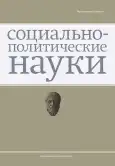Religious policy of Japan in the XV–XVII centuries in the context of centralization of authority and the emergence of realistic authoritarianism
- Авторлар: Filippov A.R.1
-
Мекемелер:
- National Research University “Higher School of Economics”
- Шығарылым: Том 13, № 2 (2023)
- Беттер: 36-43
- Бөлім: History and Theory of Politics
- URL: https://bakhtiniada.ru/2223-0092/article/view/145519
- DOI: https://doi.org/10.33693/2223-0092-2023-13-2-36-43
- ID: 145519
Дәйексөз келтіру
Аннотация
This publication attempts to study the religious policy of Japan from the time of the unification of the country through the efforts of Oda Nobunaga and Toyotomi Hideyoshi to the consolidation of the Tokugawa shogunate in close connection with the ongoing political processes – the centralization of authority and the formation of the Tokugawa military oligarchy based on realistic authoritarianism. The significance of the ideological postulates of the religions common in pre-Edo and Edo Japan is established in the context of overcoming feudal fragmentation and the consistent construction of the Tokugawa shogunate. The main directions of the state religious policy of the period under review are singled out and the nature and political reasons for the positive or negative attitude towards common religions on the part of the ruling class are revealed. The understanding of realistic authoritarianism as a set of methods for retaining Tokugawa power by harsh, manipulative, but excluding direct violence methods is being consolidated. The thesis is substantiated that the Confucian doctrine became the ideological basis for the centralization of authority and the emergence of realistic authoritarianism of the first Tokugawa shoguns, the implementation of which made it possible to establish the regime of the Tokugawa military oligarchy through the policy of “soft power”, blocking the emergence of centrifugal and separatist tendencies among influential daimyo. It is proved that the state during the period under review pursued a conservative religious policy which was expressed in the patronage of traditional beliefs (Shintoism, Buddhism and Zen Buddhism) and the prohibition of Christianity, which was perceived, on the one hand, as a belief alien to the Japanese and, on the other hand, as a worldview that encroaches on the foundations of Japanese statehood. In the context of the study of religious policy towards Christians, it is concluded that the Confucian idea of achieving state order by unifying social life and consistently getting rid of political and axiological factors that could bring disorganization into normal and habitual functioning of social matter played a significant role in the prohibition of Christianity and Catholic missionary work.
Толық мәтін
##article.viewOnOriginalSite##Авторлар туралы
Anton Filippov
National Research University “Higher School of Economics”
Хат алмасуға жауапты Автор.
Email: anfilippov98@mail.ru
the 2nd years master student at the National Research University “Higher School of Economics”. Moscow, Russian Federation
Ресей, MoscowӘдебиет тізімі
- Daidoji Yu., Soho T. Bushido. The Samurai’s Code of Honor. Moscow: AST Publishing House; OGIZ. 2021. 256 p.
- Kitagawa J.M. Religion in the history of Japan. St. Petersburg: Nauka, 2005. 588 p.
- Mason R.G.P., Kaiger J.G. Brief history of Japan. Moscow: Hummingbird; ABC-Atticus, 2022. 512 p.
- Soho T., Daidoji Yu., Musashi M. Samurai. The way of the will and the sword. Moscow: AST Publishing House, 2022. 400 p.
- Tadashige V. Shinkageryu. Moscow: Society of Martial Arts Shinkageryu, 2013. 143 p.
- Yagyu Munenori. Heiho Kaden Se: A book passing into the family about the art of the sword. St. Petersburg: “Eurasia”, 1998. 224 p.
- Leshchenko N.F., Meshcheryakov A.N., Streltsov D.V. et al. History of Japan: Textbook for university students / D.V. Streltsov (ed.). Moscow: Publishing House “Aspect Press”, 2018. 592 p.
- The Bushido Code. Hagakure: Hidden in the foliage. Transl. from the Japan. A. Bochenkova, V. Gorbatko. Moscow: Eksmo, 2003. 428 p.
- Paramore K. Ideology and Christianity in Japan. London: Routledge, 2009. 230 p.
- Sūden I. Eiinbon Ikoku nikki: Konchiin Sūden gaikō monjo shūsei. Tokyo: Tōkyō Bijutsu. 1989. 237 p.
- Kuzhel Yu.L. Japan’s ties with the European Catholic world (the end of the XVI – the beginning of the XVII century). Yearbook Japan. 2019. Vol. 48. Pp. 321–343. (In Rus.)
- Nelyubin P.G. “Bateren tsuiho no fumi” – an early anti-Christian document of the Tokugawa Shogunate. Bulletin of the Scientific Association of Students and Postgraduates of the Faculty of History of Perm State Humanitarian Pedagogical University. Series: Studis historica juvenum. 2018. No. 1 (14). Pp. 190–194.
Қосымша файлдар








